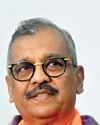
THE WORLD IS facing a confluence of problems that arose from Covid, climate disasters and regional conflicts. Barbadian economist of Indian origin Avinash Persaud is seen as a man who can help solve them. He is the key brain behind the Bridgetown Initiative of Barbados that sets out three ways to change how development finance works on the global stage. His pragmatic solutions to reform the international financial systems and climate financing are getting support both from the developed and the developing world. Persaud calls himself a “man in a hurry” and urges the world to make every effort needed to save the planet. Excerpts from an exclusive interview:
Q/ The world, especially the global south, is facing hardships because of many shocks—Covid, climate disasters, Russia-Ukraine conflict and a strong dollar. Do you think there is widespread pessimism in the global economic sphere?
A/ The world is at a very difficult place. You mentioned Covid. And that led to a significant increase in debt, a shock to our economic systems that not all countries have managed to get over. And then related to Covid, the big fiscal stimulus in the wealthy countries is now raising interest rates and [the result is a] strong US dollar. And that is compounding the problem. That is why an unprecedented number of countries around the world are facing a debt crunch, and appealing to the International Monetary Fund for short-term support. So, we are in a very uncertain, fragile place, underscoring the inadequacy of the international environment to help out emerging and developing economies.
Q/ Will the debt crisis in emerging markets affect India?
This story is from the {{IssueName}} edition of {{MagazineName}}.
Start your 7-day Magzter GOLD free trial to access thousands of curated premium stories, and 9,000+ magazines and newspapers.
Already a subscriber ? Sign In
This story is from the {{IssueName}} edition of {{MagazineName}}.
Start your 7-day Magzter GOLD free trial to access thousands of curated premium stories, and 9,000+ magazines and newspapers.
Already a subscriber? Sign In

TAKING WINGS AGAIN
Telangana plans to redevelop Warangal's Mamnoor airport, built by the Nizam and destroyed by the Indian Air Force during Hyderabad's annexation in 1948
Identity tracking
Without reading like a tutorial, The Tamils gives a comprehensive account of the community's history and culture

THE ART OF WINNING
The real drama of the Oscar race happens before the envelope opens

Kala cotton is pure magic
One of the greatest things about being a fashion journalist in India is that you are never just one thing. Your stories can take you to glamorous fashion weeks across the world, and they can also take you to the remotest parts of India, allowing you to tell stories of people whose voices have been quietened. Like the farmers of the indigenous kala cotton plant.

Revival mode
Jitendra Patwari has set off a generational shift in Madhya Pradesh Congress

No freedom in appeasement
Fearsome gods and kings are appeased, not opposed. Through history, this ingrained placatory habit is ordained by all religions and cultures.

NIA WILL TRY RANA FOR CHARGES THAT HAVE NOT BEEN DISCLOSED
A high-profile lawyer, Ujjwal Nikam has argued crucial cases for the government. He was special public prosecutor in the 1993 Mumbai bomb blasts case and the 26/11 attacks case. His arguments led to the conviction of terrorist Ajmal Kasab, who was executed in 2012.

Men, too, have glass ceilings
The more I read about rape, suicide, family troubles, unemployment, toxic masculinity, excessive religiosity and hysterical jingoism, the more I feel we have got hold of the wrong end of the stick.

Jumbo love
Laxmi, once forced to beg on Mumbai streets, found home and freedom at the Wildlife SOS - Elephant Conservation and Care Centre in Mathura

THE DEVIL AND THE DETAILS
The extradition of Tahawwur Rana, whom US President Donald Trump called a \"very violent man\", could tie loose ends related to 26/11 and lead to the uncovering of valuable intelligence on attacks planned on India thereafter